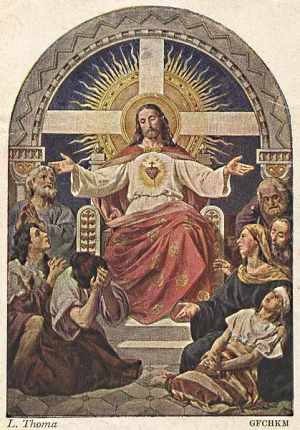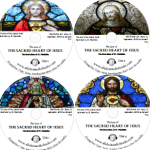Reparation to the Sacred Heart of Jesus: Our Lord Wishes Us to Make Reparation!
Click Here to Download the Entire AudioBook on Reparation to the Sacred Heart of Jesus
Transcript
The necessity for our making Reparation is logically deduced from the very foundation of our Catholic Faith and, in  particular, from the doctrine of the Mystical Body of Christ, and that of the Redemption. It is likewise shown to be an imperative duty from the long, formal, and constantly reiterated chain of instructions given by our Blessed Lord.
particular, from the doctrine of the Mystical Body of Christ, and that of the Redemption. It is likewise shown to be an imperative duty from the long, formal, and constantly reiterated chain of instructions given by our Blessed Lord.
Whether we open the Gospels, or examine the great revelations handed down to us, we constantly see our Lord setting forth His great desire to find souls capable of suffering, utilising it for the glory of God and the salvation of souls.
Let us turn first to the Gospel. There are numerous texts which teach the obligation of doing penance as an act of Reparation; no law is more frequently inculcated.
Our Master chose St. John the Baptist as His precursor. What did he preach ? ” The baptism of penance for the remission of sins ” (St. Luke 3:. 3). What does he continually repeat, day after day, on the banks of the Jordan, where Jesus Himself was soon to commence His ministry? “Do penance, for the kingdom of heaven is at hand ” (St. Matt. 3: 3). How does he live ? As an example : ” John had his garment of camels hair … his meat was locusts and wild honey,” his abode ” the desert of Judea ” (ibid., ver. 4). How does he answer those who came to him asking “Who art thou ?” “I am the voice of one crying in the wilderness : Make straight the way of the Lord.” Men had made God s path crooked; it had to be made straight again : this is reparation.
What a well merited rebuke he gave to those hypocrites who came to ask for the baptism of penance, without any intention or desire to lead a better life! ” Ye brood of vipers. . . . Bring forth fruit worthy of penance. . . . The axe is laid to the root of the trees. Every tree that doth not yield good fruit shall be cut down and cast into the fire. . . . Hasten, for there cometh One; He is even now among you, and you know Him not. If He finds good wheat, He will gather it into His barns, but He will burn up the chaff with unquenchable fire.”
Is it possible to set forth, in a clearer or more thrilling manner, the necessity of suffering as an act of expiation, the obligation of returning to the straight path, of atoning for past faults, of imploring pardon by offering some proportionate penance?
Afterwards our Blessed Lord Himself appeared in public. He commenced His ministry by fasting in the desert for forty days. When He called men to be His Apostles, He bade them leave all and follow Him, and exhorted the crowds that surrounded Him to deny themselves. St. Matthew significantly remarks : ” From that time, Jesus began to preach and to say: Do penance, for the kingdom of heaven is at hand.” St. Matthew seems to point out that from the very beginning of Jesus Public Life, He preached on the theme so dear to Him and so constantly reiterated in His discourses.
Moreover, our Lord extolled suffering and expiation for sin all His life. He taught men to give one coat to the poor if they had two; not to trouble about what they should wear; that money was to be despised and heavenly treasures alone valued. He constantly anathematised those who loved the broad road, and ever strove to lead men to walk in the narrow way. He predicted untold woes to the rich and to hypocrites. He taught men that the truly blessed are those who are poor and gentle; those who weep; those who thirst for justice, who are merciful, pure in heart; those who are peacemakers, and who suffer persecution. Such is His doctrine! ” Are you willing,” He asks, “to follow Me seriously? Then, as a preliminary step, you must deny yourselves and embrace the cross with both hands : nothing less will avail.”
Our Lord does not restrict His teaching to words: had God merely given maxims or precepts, He would not have been understood. He reduced His words to actions, ” The Word was made flesh.” That which had hitherto reached only to the ear became visible to the eye : precept became example. Jesus lived His whole life upon earth as a Victim, that He might give us an example and teach us how to suffer.
As soon as He came into this world how did He explain His life s work ? He saith : ” The victims of the past thou wouldest not; then said I : Behold, I come “.
In the womb of Mary, Jesus only began His apprenticeship for the victim s life He was to lead later on in the confinement of innumerable tabernacles. Jesus was born; and in the manger, in the stable, in Bethlehem, He was still a victim. As Tertullian writes: ” He was a Victim from the virgin birth.” From his birth onward, His sufferings continued; He endured the Circumcision, the Flight into Egypt, the Exile there nothing was lacking as regards suffering. Hence, in His Public Life, Jesus could say ” Blessed are those that suffer;” ” Blessed are the poor.” How these words would have provoked resentment, had He been born in luxury! But He was the most destitute and afflicted of all.
In Nazareth, He lived a hidden life. Had He not done so, men would never have accepted the doctrine of humility which He preached afterwards. As it is, in spite of His example, how few trouble about His doctrine! Men love to be seen; He effaced Himself during thirty years. A ransom was required to atone for mens pride, so Jesus lived a hidden obscure life of painful toil.
During His Public Life, Jesus, wearied and footsore, tramped the roads of Palestine in search of souls. He was thirsty and asked the woman of Samaria for a drink; He spent nights in prayer; unceasingly he exercised His ministry. Foxes have their holes; birds, their nests; but the Son of Man had not where to lay His head, not a roof to shelter Him. He had to make Reparation for all those who pursue vain things, and worship the golden calf; for the children of God who either forget or deliberately neglect to pray to Him; for the sowers of evil seeds, and for those in whom the good seed remains sterile. When Jesus began His Ministry, what name did the Baptist give Him?” The Lamb of God who taketh away the sin of the world.” John meant: Here is the silent Victim for all men who will save the world. Throughout three years, Jesus with Divine patience endeavoured to impress upon His Apostles that the Christ must be delivered up to His enemies. They could not understand His words; their meaning only dawned upon them when, from their hiding-places in Jerusalem, they saw Him afar off nailed to the Cross on the summit of Calvary.
But above all, Jesus stands forth as our Victim in His Passion. Then, because He so willed, He was betrayed, denied, insulted, buffeted, outraged and nailed to the Cross. Thus He willed to teach us to suffer in our body, our affections, our reputation and our honor. He suffered likewise, because Divine justice required some compensation for all those who only live for pleasure, who betray their baptismal vows and their Faith, for those who deny the Faith, who mock at the Passion and persecute Christ’s disciples, for those who scoff at the Church, the Pope and priests in a word, for all who, in their shameless egoism, find the Cross of Christ so irksome. Christ so much loved Reparation that He glorified it in Mary Magdalene, once publicly known as a sinner, who became in “Mary of Bethania,” where He called her to Himself, a model of repentance and love, and afterwards Mary of Golgotha. At the foot of the Cross there were but three you will never find many where there is suffering to endure three only, one man and two women Mary, John, and the Magdalene between two who had never lost their innocence, one with innocence regained at the price of generous expiation through a twofold breakage, her broken vase and her broken heart.
Download MP3 of Reparation to the Sacred Heart of Jesus: Part 3 Our Lord Wishes Us to Make Reparation (Right Click and Select Save As)
Click Here to Go Back To the AudioBook Page
Credits
This work is an abrigement of a Chapter from the book The Ideal of Reparation by Father Raoul Plus SJ or more details on how this work was abriged please visit the Audiobook page
Image from image the public domain here
You may also like:
- Reparation to the Sacred Heart of Jesus: Part 2 How Did Christ Make Reparation?
- Reparation to the Sacred Heart of Jesus: Part 1 Reparation is a Fundamental Obligation of Christianity.
- Catholic AudioBook: Reparation to the Sacred Heart of Jesus
- Catholic Audiobook : The Love Shown to us by Jesus in his Passion.
- Catholic Audiobook: St. Thomas Aquinas for Lent
- Audiobook: The Great Advent Homilies of St Bernard of Clairvaux
- Catholic Audiobook: The Vigil of the Natvity and Advent Homilies of St Bernard






